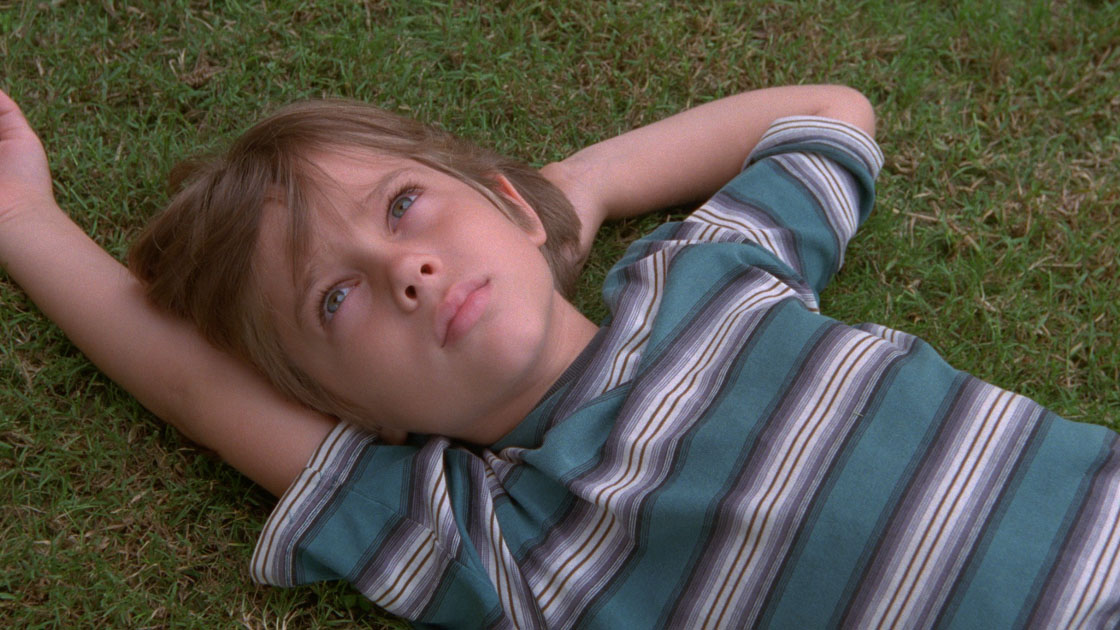On TV and at the movies, we are mostly told that the big events help shape our lives and leave the greatest impressions. We also learn that the journey is more important than the destination. Boyhood dares to tell the story of the inbetween: the little moments that when summed up collectively define a person not knowing where their life may end up. With this ambitious undertaking, Director Richard Linklater has crafted a ubiquitous experience for any audience member that is also a wonderful film about growing up and becoming who you are.
Boyhood starts with its title picture: Mason (Ellar Coltrane) staring at the sky, waiting to picked up from school. He is 6 years old at the time. Over the next 2 and a half hours, we see Mason grow up during a 12 year time period from 2002 to 2014 along with his sister Samantha (Lorelei Linklater, the director’s daughter). The two kids grow up in a split house: their father (Ethan Hawke) drifts in and out of their lives, and their mother (Patricia Arquette) is overworked and finding love in all the wrong places. The audience sees Mason grow from an inquisitive quiet kid into an artistic opinionated young adult freed from his high school prison.
Linklater’s editing team is amazing in this film. Very often, movies assume stupidity from their audience and flash how much time has passed across the bottom of the screen. You’d think Boyhood would consider the same thing, especially since the time period is very condensed. However, Linklater uses various specific ways to signify a new period. Haircuts and growth spurts are easy signifiers and seamlessly integrated into the story. As a fan of pop culture, Linklater will use the High School Musical theme song or a Harry Potter book signing (the kids love reading them) to plant us in a date and time. However, Linklater’s best transition involves removing a character in the previous time period and having the family go through a mundane day as if the person didn’t exist. These transitions establish moments in time for young Mason Jr. and give Boyhood consistent forward momentum for its lengthy running time.
Linklater also showcases his amazing attention to the day-to-day living of people. The first hour of this film is replete with little details that I had directly experienced myself. Of course grandma’s house has a bowl of candy. Of course you shoot down a sibling when vying for the attention of someone you admire. Hell, I have a pun-loving brother looking for a sight gag at any moment like Mason’s sister. There are very few BIG moments for Mason in Boyhood like a first kiss or graduation; however, the fleeting conversations give us a better picture of who the soon-to-be man is and will become. Boyhood shows equal consideration for Mason’s family, especially his parents. We see Mason’s mom learning about Pavlov’s response in school before fully experiencing how that lesson applies to her; when she truly understands the lesson, she then turns around and teaches it to her own students. Mason’s dad undergoes an amazing growth with something as simple as a car change. Boyhood shows the audience how personal growth is a slow and constantly evolving process seen in little changes over time better than any other film out there and even better than most television shows.
Boyhood’s biggest risk is Ellar Coltrane, young Mason Jr. Richard Linklater said that he picked the boy for two primary reasons: his parents were both artists and he was a very pensive kid. Both traits are evident in Coltrane as he grows up over the course of the film. You see the boy get more confident as time passes, either by a passing look or a “dead to me” stare; once he becomes an older teen, he starts speaking his thoughts more and his artistic and erudite nature becomes more apparent to the viewer. Richard Linklater’s daughter Lorelei is also a nice little revelation here: she gets more flashy dialogue early in the film and gives way to Coltrane as he gets older. She can sell an eye roll as good as any young actor out there, and plays sarcastic just as well. As for the parents, Ethan Hawke and Patricia Arquette were always gonna bring their A game. Arquette is a beacon for flawed strength, a strong role model for all single mothers out there. This woman takes care of two kids while holding a few jobs and getting her degree: pretty inspiring. Her resolve is threatened by some poor relationship choices, but like any real person, she makes the right decision each time to cut her losses and get away. Hawke uses his cocky persona to make Mason Sr. out to be a stereotypical absentee parent; however, Hawke gives the character a healthy dose of reality since he really tries to be a good father to his kids over time. By the end of the film, all the lessons Hawke learns are on display as he is at a place where he can pass some useful wisdom off on his son.
Time is a fascinating thing. As young people get older, they wish for it to fly by; as people age, they wish precisely the opposite. Richard Linklater finds the perfect study of this concept in Boyhood, yet another masterpiece the underrated director can place on his growing resume. Every so often, I’ll find myself replaying moments in my head from my past and realize how it in some way helped make me into the person I am today. Boyhood is the movie world’s manifestation of that personal journey that every person goes upon, and like your past, it will grow in wonder every moment you think back upon it.


Such a beautiful film: thanks for posting the review on this one…such an underrated movie with so much to offer the audience!!
Keep up the good work!